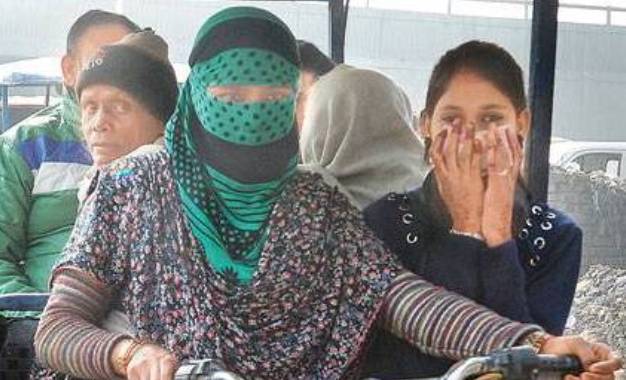Parveen Bano is 32 and drives an e-rickshaw in Seelampur, North East Delhi, to make ends meet A single parent, Bano drives her e-rickshaw in two shifts so she can also take care of her three children. She wears a hijab that covers her face except her eyes but it is difficult not to see the steel behind the veil.
I originally belong to Badaun in Uttar Pradesh, a place where women are not allowed to have their opinions. They are taught to obey their in-laws and take care of their families all life.
I too was living such a life when one day my husband died of cancer four years ago and soon after I was left to fend for myself with three minor children. The support from my in-laws didn’t last. After your husband’s death, your value is one of a servant in a joint family. They always associate your identity with your husband’s. We were soon made to realise that we were not welcome in the house. I was unlettered and had never worked before. But I felt it was my responsibility to feed and take care of my three children with dignity.
I came to Delhi in 2016 with the help of a relative who got me a job at a garment factory. The earnings from the factory were too little to care of everyone in the house. I have two daughters and a son. I barely used to make money at the factory. The conditions were so bad that I had to beg for rotis to feed my children every day.
Amidst trying to make my ends meet, I met a woman named Suman who used to drive e-rickshaw.I asked her to teach me to drive. She no longer lives in Delhi but I will always be indebted to her for making me economically stronger that today I can even think of sending a child to school.
Being a single parent, I have to not only be a bread-earner but also a homemaker. Driving an e-rickshaw has given me the flexibility to do both. I wake up at 6 am and complete my household chores by 9 am. I cook food for my children and also drop my son to school. I then leave for my work.
I work in two shifts. I come back around 4 pm after collecting my son from school and again leave in the late evening. I work till 10 pm. Once I come back from home, I cook and complete other household chores. With a daily income of ₹600-700 that I make, I pay my rent for the vehicle as well as the house.
If the vehicle gets damaged I have to pay even that from my pocket and always owe some amount to my employer and my landlord. When demonetisation was announced I had a very difficult time and it left a huge hole in my pocket.
But now the things have improved. When it comes to facing retaliation from male counterparts, I have been lucky. Nobody disturbs me in my work. That way I have had some peace in my struggling life.
Amid my struggle, I want to ensure that I send both my daughters to school so that they do not have to beg before anyone or live a miserable life as we do now. Right now, I am capable of only sending my son to school due to the financial crunch.
Although I am usually short of money round the clock, I am happy that I have a respectable job and I am at least making my ends meet. The thought of what could have happened if I did not have this e-rickshaw is scary.
Also at Lokmarg
An e-Rickshaw and one happy migrant
—With editorial assistance from Lokmarg
